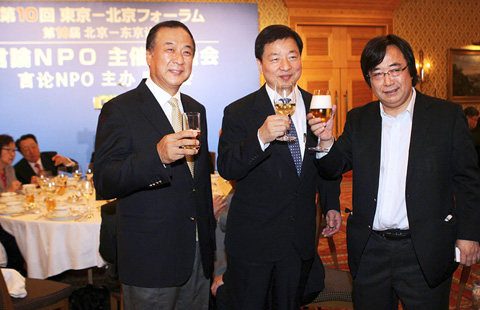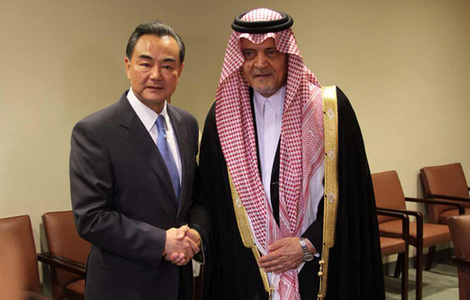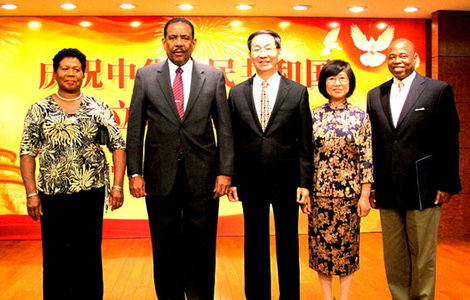Chris Nebe: Unlocking China's mystery through film
Updated: 2014-09-26 14:53
By Qi Dongzhang in San Francisco For China Daily(China Daily USA)
|
||||||||
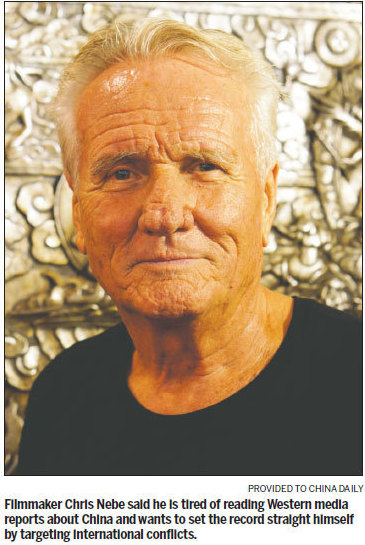
When in Beijing, Chris Nebe lives in a small hutong hotel in the Xidan area. He gets by with the few Chinese sentences he knows, eats his favorite dali noodles at a small food stand and walks to shops, bookstores and the subway.
Unexpectedly, Nebe turned into an overnight celebrity last March. He was at a press conference in Beverly Hills for his new documentary film Diaoyu Islands: The Truth, when his agent in Beijing called to tell him that his film company's website crashed because too many people were trying to watch the film online.
The Hollywood writer/producer/director soon learned what fame meant in China. Everywhere he went, people stopped him on the street and asked him if he was the director who made the film about the Diaoyu Islands, because they saw him on CCTV. When crowds gathered to ask for his autograph and to take a photo, he had to say "OK, five dollars each" to break it up.
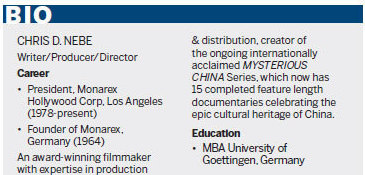
Diaoyu is only one of 12 documentaries Nebe has created through his Monarex Hollywood Corporation, which presented the Mysterious China series on Chinese history, culture and people, including: Tibet: The Truth; Yangzhou: A City of Timeless Culture; Jiangsu: Land of Good Fortune; Dali: Love at First Sight; Land of Legends; Holy Mountain; Kungfu Masters; Secrets of the Silk Road; Marco Polo's Roof of the World; Marco Polo's Shangri-la; and Marco Polo's Silk Road.
Born in the German city of Breslau - which has been Wroclaw, Poland since the end of World War II - Nebe immigrated to the US and learned the film business from an uncle in New York, who used to be an associate of Samuel Goldwyn of Metro-Goldwyn-Mayer (MGM).
He returned to Germany and became a movie distributor and imported more than 150 foreign movies to Germany. After a successful career, he decided to become a producer in Hollywood and returned to the US. After producing a number of feature-length films, including Heartbreaker, Rebels, The Naked Cage, and The Inheritors, he started making documentaries.
His connection with China started at an early age when he lived in the Far East and became fascinated by Eastern cultures.
"There is something about China that few from the West appreciate like I do," he said. "In its 5,000 years of civilization, China has never fought an aggressive war or taken land from others. In fact, it was always victimized by foreign invasions of imperial colonial powers.
"There are also amazing philosophers like Lao Tzu and his Daode Jing," he continued. "Their wise words written over 2,000 years ago are still relevant to our world today. Lao Tzu said: 'Do not tamper with nature' and 'Those who are violent will be digging their own tombs'. We have not only harmed nature but also become more and more violent in constant wars."
Nebe became a social affiliate of the Chinese community in Los Angeles in the mid 1990s and networked with local leaders. He met a vice-president at Yunnan TV and was invited to make documentaries about Chinese minorities in Yunnan province.
His Mysterious China documentaries brought him several prestigious Telly Awards in the US. He was also awarded Gold and Silver Remi Awards at the Worldfest Houston International Film Festival, Accolade Awards for Excellence, as well as awards at the Moondance International Film Festival, the Chinese American Film Festival and the Platinum & Gold American Pixel Academy Awards. 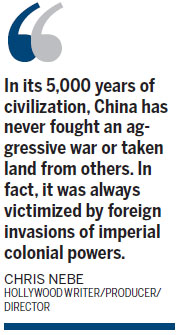
Nebe said he is tired of reading Western media reports about China and wants to set the record straight himself by targeting international conflicts.
"I pick controversial topics such as the Diaoyu Islands and Tibet since they have drawn huge media attention and Westerners want to know the truth," he said. "To make sure that I am not called by the West a paid propagandist for China, I finance those political films myself. I'm a filmmaker. If you find something interesting, you just do it."
With a Lutheran theologian father who was Dean of the Protestant University of Erlangen in Germany and a mother of East Prussian nobility related to Chancellor Otto von Bismark, who in 1848 unified Germany, Nebe said his documentaries have unique perspectives because he is a Westerner himself, and what he interprets makes sense to audiences across cultures and borders.
"I am the only one in the West who is making these kinds of documentaries," he said. "Nobody else is doing it."
He recently picked another popular-across-the-border subject for his next documentary: Burma Road - Flying Tigers.
"Many Western scholars and historians have totally eliminated the fact that it was the Chinese people who created local infrastructures that made it possible for the Flying Tigers to fight against Imperial Japan," he said. "Many have even forgotten that China was an Allied Nation in WWII, and endured great sacrifices to overcome Japan in the war. I want to convey that message in this film."
Another documentary he is working on is Inner Mongolia: In the Footsteps of Genghis Khan. He considers Khan one of the greatest rulers in history, on a par with Alexander the Great, Caesar and Napoleon.
Having a three-man staff and $500,000 worth of state-of-the-art Hollywood camera equipment tailor made for documentary filmmaking, Nebe says it takes brains in Hollywood to make good films. The size of a company does not matter. He does choose to hire American camera crews rather than Chinese when it comes to shooting in China.
"I used to work with local Chinese camera crews, but they didn't understand what was important in the West," he said. "One typical example was: once we saw a hardworking Chinese farmer in a rice field in Yunnan. He had a face showing the lines of a lifetime of suffering. I told the cameraman to film him, and the Chinese cameraman did not understand why he had to film a nongmin (peasant). I told him he's not just a nongmin, he is a man who provides your food."
"Chinese also have problem promoting themselves well, partially because of their sense of peace of harmony, and non-confrontational nature. I am very confrontational."
Nebe also plans to make a commercial movie next year called Bodytalk, which is a Hollywood movie but 100 percent filmed in China. He wrote the screenplay 10 years ago for a major Hollywood production, but it never happened, as it so often goes in Hollywood. Only recently did it receive enthusiastic attention from China.
"It's going to be a Hollywood dance film with Chinese leads and three American actors," he said. "I want to tell this wonderful bi-cultural, bi-generational story to both Chinese and American audiences through dance and music. It's very difficult to find a universal theme accepted by all, but I think this one has it."
Nebe said his life goal is to make movies and his biggest reward is getting fan mail from a worldwide audience. And now, more and more, US public television stations are asking to broadcast his documentaries because of the subjects and quality of his productions.
"I had problems getting my films on public television stations before, but not anymore. Now they run the films again and again because the quality is high, and the audience demands to know and learn more about China," he said.
(China Daily USA 09/26/2014 page11)
Most Viewed
Editor's Picks

|

|

|

|

|

|
Today's Top News
Chinese central gov't opposes illegal activities in HK
Chinese FM reaffirms support for UN
'The ticket changed my destiny'
Chicago air traffic center fire grounds 1,750 flights
Li: Financial reform gains steam
China supports UN peacekeeping
Forum ready to narrow gap in trust
7 officials punished over fatal school stampede
US Weekly

|

|

